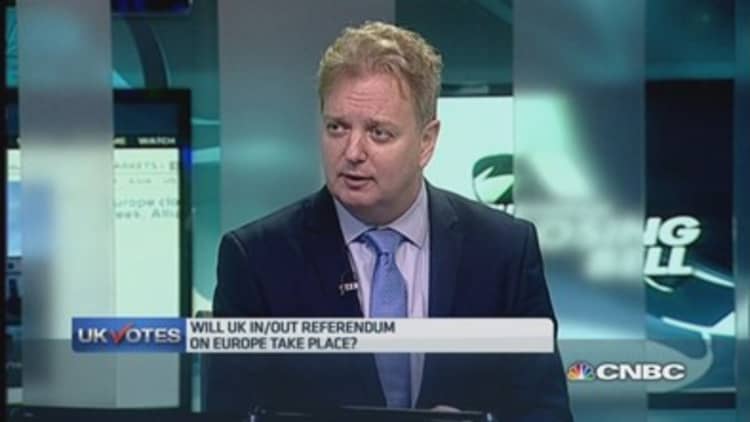There was good news for U.K. businesses on Monday, after an influential economic group said a long-awaited uptick in lending would start this year.
The EY ITEM Club predicted that financial services would start lending more to businesses in 2015, with net lending rising by almost 17 percent by 2018—funneling up to £66 billion ($99 billion) extra to U.K. companies over the next four years.
"Growth in the U.K. economy is now filtering into financial services, although turning that into profitable growth remains a challenge," said Chris Price, EY U.K. head of financial services, in an ITEM Club report out on Monday.
"Banks are poised to resume lending growth, and asset managers and insurers both foresee strong revenue growth."
This forecast uptick in bank lending follows six years of contraction after the economic crisis of 2007/08. In the six years to 2014, corporate borrowing fell by 31 percent, or £181 billion ($272 billion), according to the ITEM Club.
"While there is little doubt that traditional bank lending will find its feet again, it looks like the recent lending drought has permanently changed borrowing behavior. The challenge for banks now will be regaining market share from the alternative finance providers who have successfully plugged the gap for the last six years," said Price.
In what may provide a further spur to the U.K., bank lending is also on the rise in the euro zone, albeit slowly.
Read MoreECB's Liikanen: Lending to Greek banks in jeopardy
Loans to the private sector, adjusted for sales and securitization, ticked up by an annual 0.1 percent in December—the first growth seen since 2012, according to the European Central Bank. Some 11 billion euros ($12 billion) was lent to non-financial corporations—the strongest figure in many years.
2.9% growth seen in 2015
On Monday, the ITEM Club also raised its forecast for U.K. economic growth this year to 2.9 percent, up from the 2.4 percent estimated in October.
This is slightly more optimistic than the 2.7 percent growth expected by the International Monetary Fund, and higher than growth of 2.6 percent in 2014.
The ITEM Club attributed its upgrade to the boost provided by the plummeting price of oil—of which the U.K. is a net importer.
"In global terms, the U.K. stands to be one of the winners from the recent collapse in global energy prices," said the report. "Further rises in employment and high levels of consumer confidence will also spur growth in consumer spending."
In comparison, the ITEM club sees the U.S. economy growing by 3 percent this year and the euro zone expanding by 1.3 percent—a sizeable uptick on the growth seen there in the last couple of years.
'Brexit' risks?
With a British general election looming in May, some analysts are less sanguine about the U.K.'s economic prospects.
"Political worries are likely to rise as the election approaches, and persist afterwards," said Michael Saunders of Citi Research in a report published late last month.
In particular, the debate around the U.K.'s role and influence in the Europe is viewed as important for business, and the Conservative Party has promised a national referendum on European Union membership if it remains in power.
"At present, the most likely outcome is either a multi-party coalition or a minority government and both would be relatively weak," said Saunders.

The upcoming election is "set to be the most unpredictable for nearly a century," according to Deutsche Bank analysts, who warned of a lose-lose situation for investors.
"For investors, there may be no good outcomes," said Deutsche's George Buckley and Oliver Harvey in a report last month.

